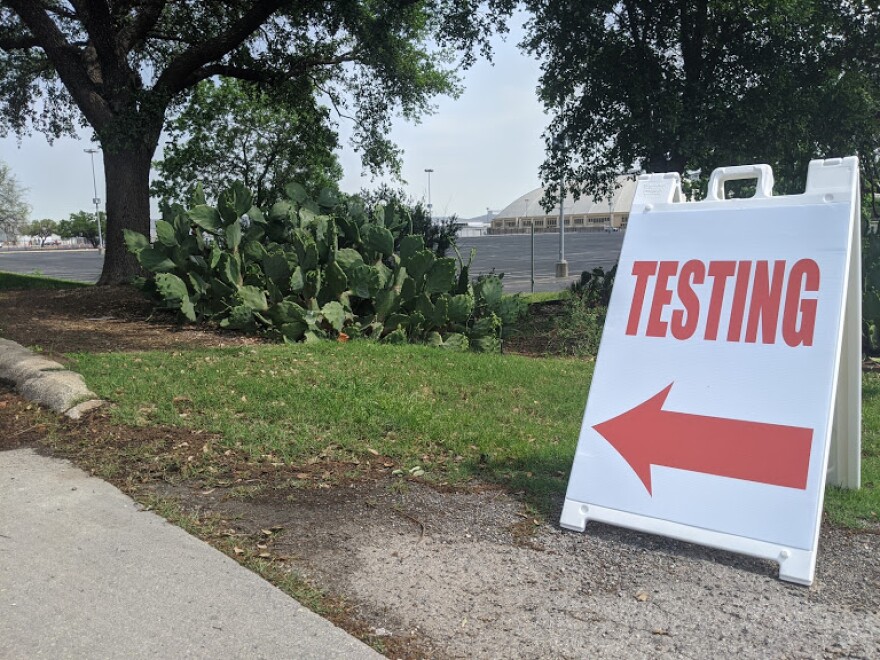Earlier this week President Trump said 1 million people have been tested for COVID-19 in the United States. According to a COVID tracking website, fewer than 36,000 of those people are in Texas and fewer than 2,000 are in San Antonio
Freeman Coliseum in San Antonio can hold more than 11,000 people for big events like the rodeo, concerts and even circuses. It’s about 70 years old, but next to it is the newer, bigger AT&T center.
For the last week or so that property has had a different use. It’s where people have been going to get coronavirus testing.
The only people who can get tested for coronavirus right now are health care workers, first responders, VIA bus drivers, hospital patients and people with a doctor’s order.
The number of people getting tested in Bexar County is increasing. Still, because Metro Health is helping process tests for more than two-dozen counties it's difficult to catch up.
Before a backlog of test results came through, San Antonio Mayor Ron Nirenberg said the process was in limbo Monday.

“There’s been 1,000 done at the federal lab, the drive-up lab at the coliseum. Unfortunately, there is a bottleneck of data sharing. We’re working through that right now,” he said.
Without more tests no one has a clear idea of just exactly how many coronavirus infections there are in San Antonio.
This concern echoed by the boots on the ground in San Antonio including doctors in private practice.
“There’s a difference between the reality on the ground and the people we are seeing that are sick,” said Dr. Lindsay Irvin, a doctor at Alamo Heights Pediatrics.
“What’s happening on the Metro Health website – and God bless them they are doing their best with what they have – but the numbers I am seeing (on) their website does not reflect even what I’m seeing in my own practice,” Irvin said.
She explained she’s seeing sick kids with sick families, who have the symptoms of COVID-19, but she can’t get them tested. Even after the expansion into the coliseum, she said she can’t get them tested.
Without testing, why does she think it’s COVID-19?
Irvin says there’s an old saying in medicine, “It's like your Aunt Mildred. You know her, and you know what she looks like, and you know who isn't her."
She’d like to be able to get her patients tested to confirm her Aunt Mildred diagnosis.
Why have tests been so hard to come by?
A botched release of tests from the Centers for Disease Control in February were supposed to be used on Wuhan evacuees, like the ones who were housed at Lackland Air Force Base. The federal government has struggled to catch up.
The first tests had a malfunctioning component, and as recently as two weeks ago, some of the tests being used at mobile testing centers in San Antonio lacked swabs to collect virus samples, Irvin said.
“There’s this little, bristly Q-tip that you need to use to collect the specimen from patients noses, and then you have to put it into a little viral culture medium and it needs to be refrigerated,” Irvin said.
Doctors all over Bexar County, like Irvin, donated their own viral collection kits to the mobile testing sites.
But it’s these kinds of problems – in addition to a spike in demand – that leave communities rationing tests for only those at high-risk of exposure because of their jobs, or those who are sick enough to be in the hospital or get a doctor’s note.
Some may wonder, “Why worry about more widespread testing? Why not just assume everyone’s sick?”
Epidemiologist Cherise Rohr Allegrini, director of the Immunization Partnership San Antonio, said that’s what we’re doing now. It’s why we’re all staying home.
“Widespread testing allows us to find those people in the population who are infected but may not be very sick. So, if we can find those people and put them in isolation, then we could actually stop the spread of the disease,” Allegrini said.
Metro Health feels comfortable with the amount of testing it’s able to do right now. In an email, Monday afternoon, the director said they “feel confident with the current tests Metro Health has. The Federal Government has plenty and so do private labs.”
With regard to the relative lack of confirmed COVID-19 cases in South Side zip codes, where fewer people have access to health insurance and doctors, Mayor Nirenberg said if people who are sick and don’t have insurance – no matter where they live – need to be tested.
“And so we ask you to contact a provider and if you don’t have a provider contact our Metro Health hotline. We will make sure that there’s a phone assessment done, and if necessary you’re sent to that pre-approved testing lab even if you don’t have a provider,” said Nirenberg.
The city says there are around 40 partners doing testing in Bexar County, including CentroMed, which is helping people without insurance get tested.
If you think you might be eligible for a test, San Antonio Metro Health has more information here.
Back out by the Freeman coliseum, where they’ve been doing the pre-approved testing, there will be even more activity this week. It is being prepped as a 250-bed hospital in case the COVID surge overwhelm city hospitals.
Bonnie Petrie can be reached at Bonnie@TPR.org and on Twitter at @kbonniepetrie.



